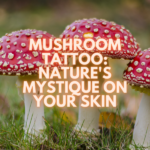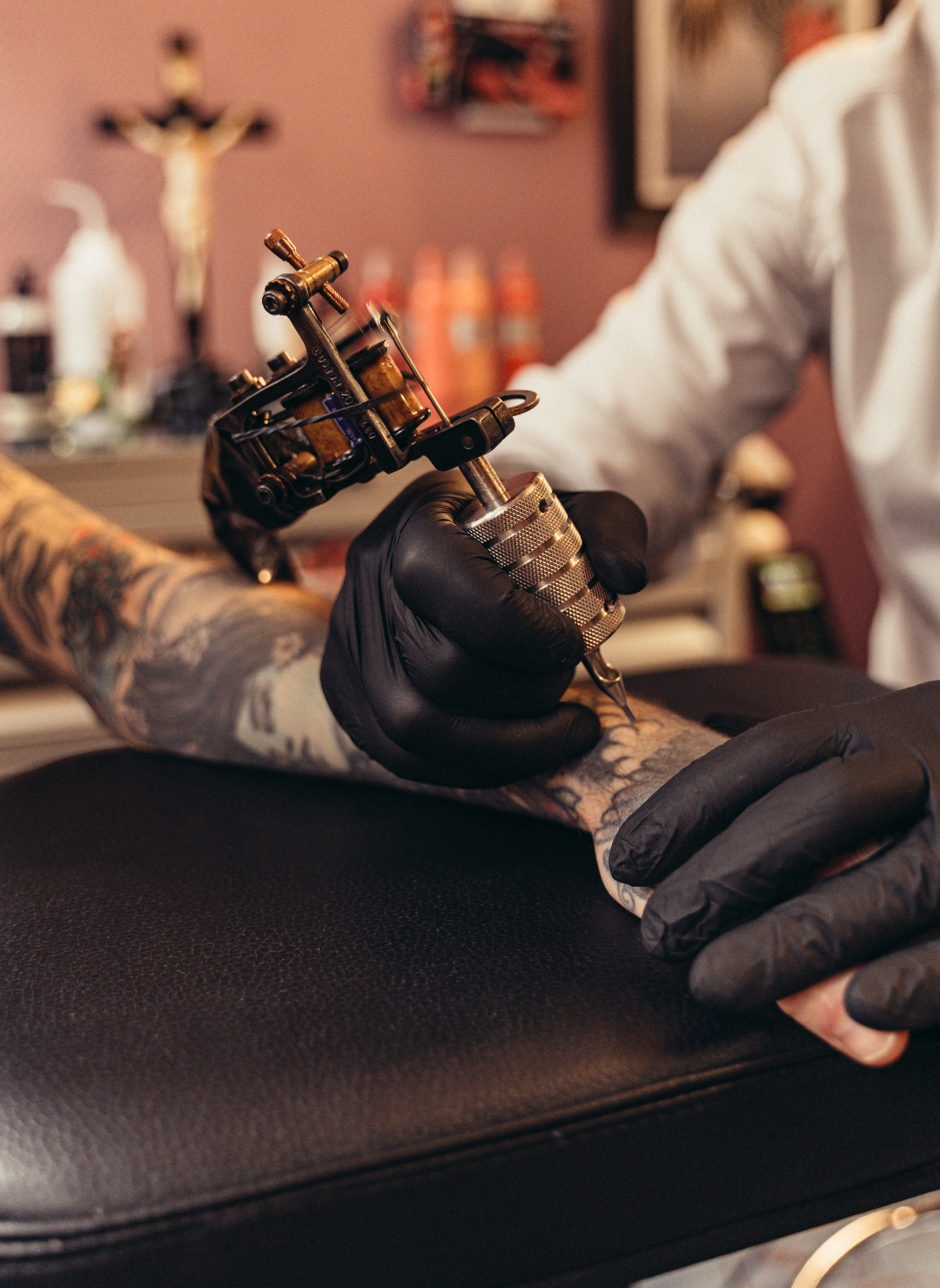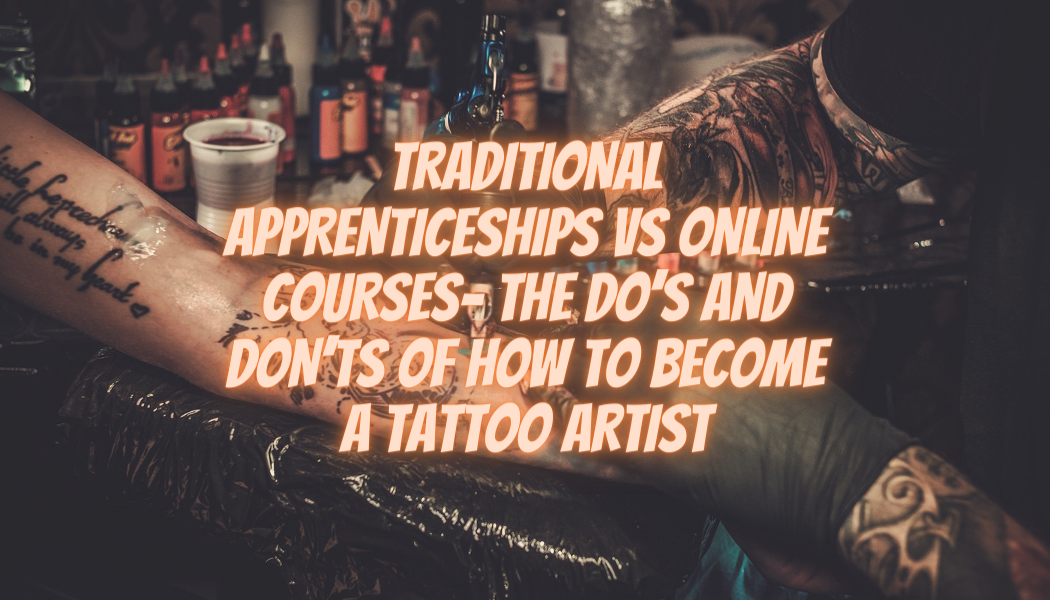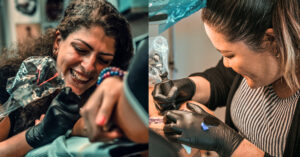
Bird Tattoos: A Historical Flight of Freedom and Beauty in Ink
February 16, 2024
Mushroom Tattoo: Nature’s Mystique on Your Skin
February 23, 2024Read me this article
Embarking on becoming a Tattoo Artist is like stepping into a world where creativity meets technique, and each stroke tells a unique story. Today, let’s explore the age-old debate: Traditional Apprenticeships vs. Online Courses – and delve into the do’s and don’ts of how to carve your path into this vibrant and human-centric art form.
The Essence of Tattoo Artistry: Blood, Needles, and Human Connection
Before we dive into the world of apprenticeships vs online courses, let’s grasp the essence of Tattoo Artistry. It’s not just about ink on the skin; it’s a dance of blood, needles, and human connection. This art form is deeply rooted in tradition; each piece carries the artist’s soul and the client’s narrative. Understanding this primal connection is crucial as we explore the avenues of learning to become a Tattoo Artist.
Before starting your tattooing journey, make sure to familiarize yourself with the Statewide Tattoo Laws and Regulations Across the USA. Understanding these regulations is crucial to ensure compliance and success in your tattoo career.
Learn more about the profession on our website or read how to change careers and become a Tattoo Artist!

Listen to an Exclusive Audio Commentary
Traditional Apprenticeships: The Art of Hands-On Mentorship
The Do’s: Learning from the Masters
In the realm of tattooing, the importance of traditional apprenticeships cannot be overstated. The hands-on experience of working under a seasoned Tattoo Artist is like a rite of passage. The mentor-mentee relationship transcends a mere transfer of technical skills; it’s a journey where the apprentice imbibes the artistry, hygiene practices, and the sacred responsibility of permanently marking another person’s skin.
The Don’ts: Avoiding Shortcuts
Crucially, in the traditional apprenticeship route, avoiding shortcuts is imperative. Becoming a Tattoo Artist needs patience and dedication. Skipping steps or rushing through the learning process can compromise the quality of your work and potentially harm clients. Remember, tattooing is not a skill to be hurried; it’s an art to be mastered over time.
Human Connection Tip: The Importance of Observation
In the blood, needles, and ink world, having a mentor physically watch what you’re doing is invaluable. The mentor’s keen eye catches nuances that online courses might miss. The mentor imparts technical skills and teaches the subtle art of reading a client’s body language and adapting to their comfort level. In the battle between, traditional apprenticeships vs online courses, it’s the human touch that sets traditional apprenticeships apart.
You can learn about the journeys of some of the most promising Tattoo Apprentices from across the globe here, to help figure out that traditional apprenticeships are the best form of education for you in your read to becoming a Tattoo Artist.
Listen to an Exclusive Audio Commentary
Online Courses: Navigating the Virtual Ink World
The Do’s: Grasping Fundamentals
Online courses offer flexibility and accessibility, appealing to many aspiring Tattoo Artists. Grasping the fundamentals is crucial. These courses can provide a solid foundation before diving into hands-on experience.
The Don’ts: Relying Solely on Virtual Learning
While online courses offer convenience, the key is relying on something other than virtual learning. Tattooing is an art form that demands a tactile connection with the tools and the canvas – in this case, the human skin. Virtual lessons can’t replace the hands-on experience of apprenticing under a skilled artist.
Human Connection Tip: Seek Virtual Communities
Despite the physical distance, online platforms allow for virtual communities. Engage with fellow learners, seek advice, and share experiences. Learning from the collective wisdom of an online community can add a layer of human connection to your virtual education.

Balancing Act: Traditional Apprenticeships vs Online Courses and Blending Tradition and Technology
The Do’s: Finding a Hybrid Approach
The sweet spot lies in balancing traditional apprenticeships and online courses. Begin with a solid foundation through virtual learning, grasping the theoretical aspects. Follow it up with a traditional apprenticeship to refine your skills under the watchful eye of a mentor. This hybrid approach ensures a comprehensive education that marries the best of both worlds.
The Don’ts: Ignoring the Practical Side
In this balancing act, pay attention to the practical side of tattooing. The tactile feel of the machine, understanding pressure, and mastering the art of shading can only be honed through hands-on experience. Online courses serve as supplements, not substitutes, for the physicality of Tattoo Artistry.
Human Connection Tip: Foster Mentor Relationships
Even if you opt for online courses initially, feel free to seek mentorship. Attend workshops, contact seasoned artists, and build connections within the tattooing community. The guidance of a mentor, even in a limited capacity, can elevate your learning experience.
Want to learn all about how to become a Tattoo Artist? Apply for the apprenticeship program at our Tattoo School! Find a tattoo apprenticeship near me.
Choosing the right tattoo school can make or break your career as a tattoo artist. Learn everything you need to know in our Ultimate Tattoo School Comparison Guide: How Much? How Long? What Makes a Great Tattoo School?.
Listen to an Exclusive Audio Commentary

Ink’s Final Verdict: Embrace the Journey
Ultimately, the key is to embrace the journey, whether you choose a traditional apprenticeship, opt for online courses, or embark on a blend of both. Tattoo Artistry is not a destination but a continuous evolution of skills, creativity, and human connection. Remember, each drop of ink carries the weight of your dedication, and every needle stroke tells a story.
However, overall, using a tattoo apprenticeship to get ahead of your competition, provides you with the skills, knowledge, and connections needed to succeed in a competitive industry.
As you navigate the inked path, respect the traditions, harness the benefits of technology, and honor the human connection at the core of this art form. Becoming a Tattoo Artist is a profound journey that intertwines the ancient rituals of mentorship with the contemporary accessibility of virtual learning. So, pick up that tattoo machine, blend tradition with technology, and let your ink journey unfold. The canvas is waiting, and the stories you’ll tell are yet to be written in blood, needles, and the artistry of human connection.





